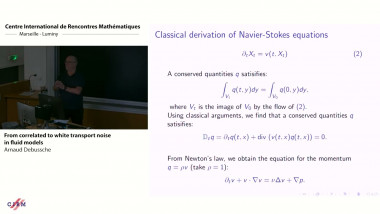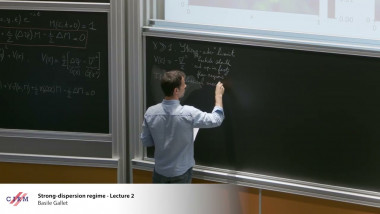
From correlated to white transport noise in fluid models
By Arnaud Debussche

Inertia-gravity waves interacting with background flows- lecture 2 - Strong-dispersion regime
By Basile Gallet
Appears in collection : Physics and Mathematics of hydrodynamic and wave turbulence / Physique et Mathématiques de la turbulence hydrodynamique et de la turbulence d'ondes
The Ocean hosts a combination of slowly evolving balanced mean flows and rapidly evolving inertia-gravity waves (IGWs). While reduced models describing the slow balanced flow are standard textbook material [1], the description of the wave field is an active area of current research. We will first consider near-inertial waves (NIWs) induced by wind blowing over the Ocean, with the goal of determining their spatial reorganization by a background mean flow [2]. After deriving the standard asymptotic model governing NIW mean-flow interaction [3], we will highlight an analogy with the (quantum) dynamics of charged particles in a background electromagnetic field. The analogy offers a shortcut for predicting the spatial organization of the wave field using elementary methods from quantum physics and statistical mechanics. Time-permitting, we will then move on to fully 3D IGWs interacting with a slow background, focusing on the resulting cascade of wave action to small scales [4]. This is an elementary example of a turbulent cascade in a linear wave system, paving the way for subsequent lectures by G. Krstulovic on turbulent cascades in nonlinear wave systems.
